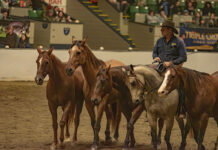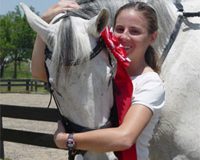 |
| “Longeing” and “lungeing” are acceptable spellings, but “lunging” is a non-equestrian term used primarily in fencing and aerobics classes. No wonder we’re all confused. |
Get excited, friends. March 4 is National Grammar Day. If you’ve ever found yourself grumbling about a misplaced apostrophe on a store’s marquee or incorrect homophone usage in a friend’s Facebook status update, this is the holiday for you.
Here at Horse Illustrated HQ, we encounter some unique grammar and spelling problems that simply aren’t answered by the AP Stylebook. For example, when you put your horse on a 30’ line and have him go in circles around you, are you longeing him, or lungeing him? I thought this was a simple one. The USEF says “longeing” in its rule book. In vaulting, the person holding the line and guiding the horse is the longeur. It’s from the French longueur, meaning “length” or allonge meaning “to lengthen.” Lunging, on the other hand, is from the English “lunge,” which translates roughly to, “Ow, my quads are burning.”
It’s not so simple, though, because the FEI has recently adopted the common British spelling of “lunge” and “lunger” in their rule book, but still use “longeur” in their news releases. Jury’s out on this one, I guess, but since we’re a U.S.-based publication and the USEF has remained consistent (so far) I will stick with longe. In any case, it’s never “lounge,” but I do get a kick out of that oddly common misspelling. My horse isn’t that into being longed, but if there were a national championship for lounging, he’d win.
My horse also used to be quite competitive in the saddle seat arena, but never the saddleseat arena. Why? Well, open your USEF rule book and you’ll see that there is a saddle seat division, but never once is it written as a single word. When Helen Crabtree published the definitive guide to the sport, she titled it “Saddle Seat Equitation.” Nevertheless, the single-word spelling persists, even among saddle seat riders. Go figure.
Another uniquely equestrian grammar issue is the question of broke vs. broken. My horse is broke, and he’s unbroken. These are both good things. The former means he’s trained to be ridden, and the latter means he’s still functioning and not lying on the ground in pieces. I suspect this one causes problems because people want to treat the horse-world term the same way they treat the non-horse term. It would be incorrect to say, “I can’t make the frozen margaritas for our National Grammar Day party tonight. My blender’s broke.”
Because of this, it sounds incorrect to a grammatically educated ear to hear, “You’ll have a great ride, I promise. Firebrand is completely broke.” It is correct, though, because if Firebrand is broken, you need to call the vet, and that’s not what you meant. This seems to trip people up even more when it comes to unbroken vs. unbroke. Unbroke isn’t really a word in non-equestrian English, so it never sounds right, but unbroken has very limited meaning, and to say your horse is unbroken is incorrect.
In cases such as “saddle seat” or “longeing” we can refer to the equestrian rule books, but until the USEF decides to add the Half-Broke Horse division, we will probably never have a concrete answer to the broke/broken, unbroke/unbroken question. Honestly, the term “broke” harkens back to an era of wild-west colt-breaking that is generally frowned upon by modern equestrian society, and we should probably phase it out in favor of terms like, “started” or “trained.” Until that happens, though, I’m squarely on Team Broke, and you won’t see me calling a horse broken unless it is actually in need of physical fixing.
Happy National Grammar Day, everyone. I hope your horses are broke and your longe lines unbroken.
Back to The Near Side





